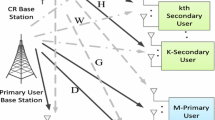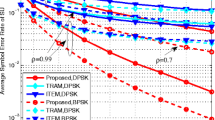Abstract
The Nth-best user selection scheme is efficient in outdated channel information conditions where the user that was the best at the selection time instant could not be the best at the transmission time instant. Also, this scheme is useful when the scheduling unit fails in error in selecting the best user among all the available users. Furthermore, the Nth-best user selection scheme is efficient in situations where, while the best user is waiting to be scheduled by a certain base station or a scheduling unit, it gets scheduled by other unit. In the proposed scheme, the secondary user with the Nth-best end-to-end signal-to-noise ratio (SNR) is scheduled the system resources. In our paper, closed-form expressions are derived for the outage probability, average symbol error probability, and ergodic channel capacity assuming imperfect estimation of channel state information and Rayleigh fading channels. Furthermore, to further analyze the system performance, the system is studied at the high SNR regime. The derived analytical and asymptotic expressions are verified by Monte-Carlo simulations. Main results illustrate that the diversity order of the studied multiuser cognitive Nth-best user selection network is the same as its non-cognitive counterpart. Also, findings show that with perfect channel estimation of secondary users, the diversity order of the system linearly increases with decreasing the order of the scheduled user, and vice versa, whereas a zero diversity gain is achieved by the system and a noise floor appears in the results when the channels of secondary users are imperfectly estimated assuming constant estimation error variance. Finally, results illustrate that the imperfect estimation of the secondary cell-primary cell channel affects only the coding gain of the system without affecting the diversity order.

Similar content being viewed by others
References
Haykin S.: Cognitive radio: brain-empowered wireless communications. IEEE J. Sel. Areas Commun. 23, 201–220 (2005)
Goldsmith A., Jafar S., Maric I., Srinivasa S.: Breaking spectrum gridlock with cognitive radios: an information theoretic perspective. Proc. IEEE 97(5), 894–914 (2009)
Ban T.W., Choi W., Jung B.C., Sung D.: Multi-user diversity in a spectrum sharing system. IEEE Trans. Wirel. Commun. 8(1), 102–106 (2009)
Zhang R., Liang Y.-C.: Investigation on multiuser diversity in spectrum sharing based cognitive radio networks. IEEE Commun. Lett. 14(2), 133–135 (2010)
Khan, F.A.; Ratnarajah, T.; Sellathurai, M.: Multiuser diversity analysis in spectrum sharing cognitive radio networks. In: Proc. 5th Int’l Conf. on Cognitive Radio Oriented Wireless Networks (CROWNCOM 2010), France, 9–11 June 2010, pp. 1–5
Yang, Y.; Aïssa, S.: On end-to-end performance of MIMO multiuser in cognitive radio networks. In: Proc. IEEE Global Commun. Conf. (GLOBECOM 2011), Houston, USA, 5–9 Dec 2011, pp. 1–5
Song, Y.; Alouini, M.-S.: On the secondary users opportunistic scheduling with reduced feedback. In: Proc. 3rd Int’l Conf. on Commun. and Net., Tunisia, 29 March–01 Apr 2012, pp. 1–6
Khan, F.A.; Tourki, K.; Alouini, M.-S.; Qaraqe, K.A.: Outage and SER performance of an opportunistic multi-user underlay cognitive network. In: Proc. IEEE Int’l Symp. on Dynamic Spectrum Access Networks (DYSPAN 2012), Washington DC, USA, 16–19 Oct 2012, p. 288
Foukalas, F.; Khattab, T.; Poor, H.V.: Adaptive modulation in multi-user cognitive radio networks over fading channels. In: Proc. 8th Int’l Conf. on Cognitive Radio Oriented Wireless Networks (CROWNCOM 2013), Washington DC, USA, 8–10 July 2013, pp. 226–230
Ratnarajah T., Masouros C., Khan F., Sellathurai M.: Analytical derivation of multiuser diversity gains with opportunistic spectrum charing in CR systems. IEEE Trans. Commun. 61(7), 2664–2677 (2013)
So J.-W., Cioffi J.M.: Capacity and fairness in multiuser diversity Systems with opportunistic feedback. IEEE Commun. Lett. 12(9), 648–650 (2008)
Yang L., Kang M., Alouini M.-S.: On the capacity-fairness tradeoff in multiuser diversity systems. IEEE Trans. Veh. Tech. 56(4), 1901–1907 (2007)
Yang, L.; Alouini, M.-S.: Performance analysis of multiuser selection diversity. In: Proc. IEEE ICC, Paris, France, June 2004, pp. 3066–3070
Fan L., Lei X., Fan P., Hu R.Q.: Outage probability analysis and power allocation for two-way relay networks with user selection and outdated channel state information. IEEE Commun. Lett. 16(5), 638–641 (2012)
Choi S., Ko Y.C.: Performance of selection MIMO systems with generalized selection criterion over Nakagami-m fading channels. IEICE Trans. Commun. E89-B(12), 3467–3470 (2006)
Salhab A.M., Al-Qahtani F., Zummo S.A., Alnuweiri H.: Outage analysis of Nth-best DF relay systems in the presence of CCI over Rayleigh fading channels. IEEE Commun. Lett. 17(4), 697–700 (2013)
Damnjanovic, A.; Montojo, J.; Cho, J.; Ji, H.; Yang, J.; Zong, P.: UE’s role in LTE advanced heterogeneous networks. IEEE Commun. Mag. 50(2), 164–176 (2012)
Kang, X.; Liang, Y.; Nallanathan, A.: Optimal power allocation for fading channels in cognitive radio networks: delay-limited capacity and outage capacity. In: Proc. IEEE Veh. Tech. Conf., Singapore, May 2008, pp. 1544–1548
Wang C., Liu T.C.-K., Dong X.: Impact of channel estimation error on the performance of amplify-and-forward two-way relaying. IEEE Trans. Veh. Tech. 61(3), 1197–1207 (2012)
Ikki S.S., Aïssa S.: Impact of imperfect channel estimation and co-channel interference on dual-hop relaying systems. IEEE Commun. Lett. 16(3), 324–327 (2012)
Seyfi M., Muhaidat S., Liang J.: Performance analysis of relay selection with feedback delay and channel estimation errors. IEEE Signal Process. Lett. 18(1), 67–70 (2011)
Vaughan R.J., Venables W.N.: Permanent expressions for order statistics densities. J. R. Stat. Soc. Ser. B 34(2), 308–310 (1972)
Gradshteyn I.S., Ryzhik I.M.: Tables of Integrals Series, and Products, 6th edn. Acadamic Press, San Diago (2000)
Simon M.K., Alouini M.-S.: Digital Communication over Fading Channels, 2nd edn. Wiley, New York (2005)
Author information
Authors and Affiliations
Corresponding author
Rights and permissions
About this article
Cite this article
Salhab, A.M., Zummo, S.A. Multiuser Cognitive Networks with Nth-Best User Selection and Imperfect Channel Estimation. Arab J Sci Eng 39, 8979–8987 (2014). https://doi.org/10.1007/s13369-014-1458-z
Received:
Accepted:
Published:
Issue Date:
DOI: https://doi.org/10.1007/s13369-014-1458-z




